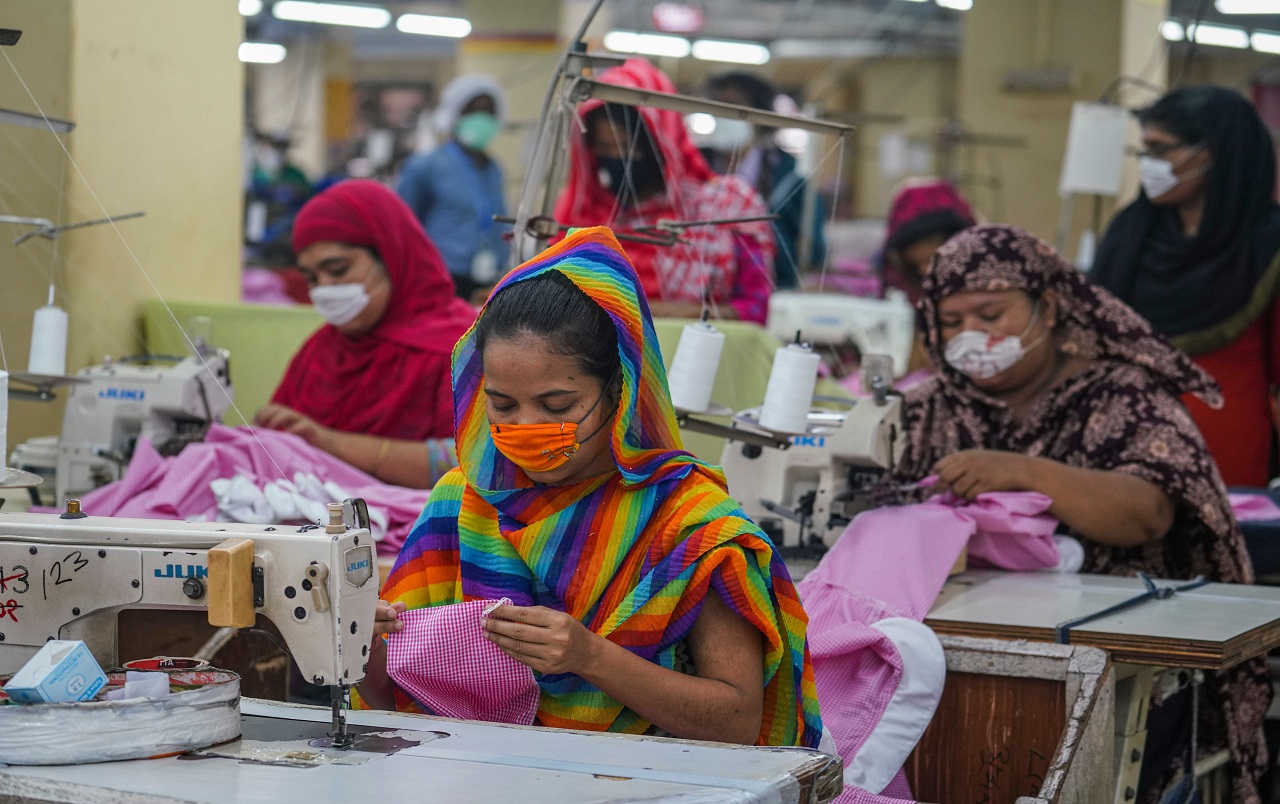This article was originally published by SPWR.
In the ready-made garments (RMG) factories of Bangladesh, workers toil all day long but earn wages inadequate to survive rising commodity prices. Not only are wages low but often they are not paid on time. Karl Marx’s thoughts on the working class (their lack of capital ownership or access to profit) are reflected in the RMG sector: workers make clothes that are exported all over the world for a profit while the workers themselves do not earn enough to buy those clothes. Moreover, the RMG sector is a widely recognized industry that has been making a crucial contribution to rebuilding Bangladesh and our economy. Though they are contributing to the economy, workers are struggling for wages.
Terms such as “class struggle”, “capitalism”, and “alienation,” were confined to textbooks until I had an opportunity to visit Ashulia for a focus group discussion (FGD), with members of a labour rights organization that fights for worker’s wages, decent workplaces, and against other injustices. Hearing about the struggle of labour rights activists and trade unions deepened my knowledge of workers’ struggles.
It was a rich discussion. The participants shared their experiences of organizing and participating in movements, demonstrations, and discussions on labour rights. When we asked them about the source of their power, they shared that since they work with garment workers, their numbers are the biggest strength. However, one of the biggest challenges is engaging the workers in the movements. Although labour rights organizations are working for the benefit of fellow workers, many workers cannot support or work directly with trade unions. Bringing together people for union activities is challenging for several reasons:
First, workers do not have enough time in the day to join protests and workshops. Factories do not want workers to be involved in any activity with trade unions. Factories intentionally assign heavier workloads, and many RMG workers do overtime. Workers even have to do overtime on two Fridays (weekly holidays) a month. In the weeks leading up to Eid, they have no weekly holidays at all. They simply do not have enough time for themselves.
This is especially difficult for women. Work in a factory starts at 8 am, and it is 10 pm when the workers finally return home. Then they need to carry out their household chores. Most do not have the time to think about—let alone fight against—injustices. Despite hectic schedules, some conscious workers try to join union activities. But demanding better hours, safer conditions, and fair pay puts them at risk of getting laid off, sometimes without notice. The fear of losing their jobs and threats from management are some of the reasons why workers are hesitant about getting involved in trade unions.
With high poverty levels, rising prices, low wages, and workers having double and triple burdens, joining the movement is itself a struggle. To survive, people need money by any means. Even if workers realize the extent of injustice, they have to submit to the pressures and restrictions. One of the activists said, “The workers never understand their own importance in the garments sector. As a result, they hardly try to quit or change jobs. Rather, they try their best to cope despite the injustices.”
Sometimes, workers do not trust trade unions because of the fear that trade unions are politically biased. Activists shared that those with political power and influence sometimes create fake trade unions, to threaten factory owners to hire them and stop them. At other times, so-called trade unions (called “pocket unions” by our respondents) work for the factory owners’ goals. Therefore, this is a reason to not join trade unions. However, not every trade union is politically biased. Some are committed to serving the workers, taking care of them, and raising a voice against injustices, without any financial gains.
Within the group, one can see immense empathy and courage. The difficulties of factory work, discussions on different injustices, and the barriers they overcame to join the union have only made the bonds stronger. With each event, protest, and discussion circle, they are fighting for their basic rights, raising their voice against injustice.
I believe these are minimum (and fair) demands. And with pressure from those outside the industry, the factory owners may be compelled to give in. So those outside the industry too have a responsibility—be it as consumers or as fellow citizens—to support trade unions in their endeavours to improve working conditions. Lastly, I must say, all that the workers want is justice in the garments sector. Provided they get ample support from their peers and co-workers, I believe one day this conflict will end.


